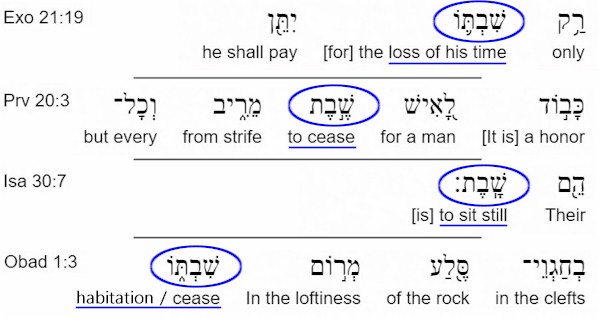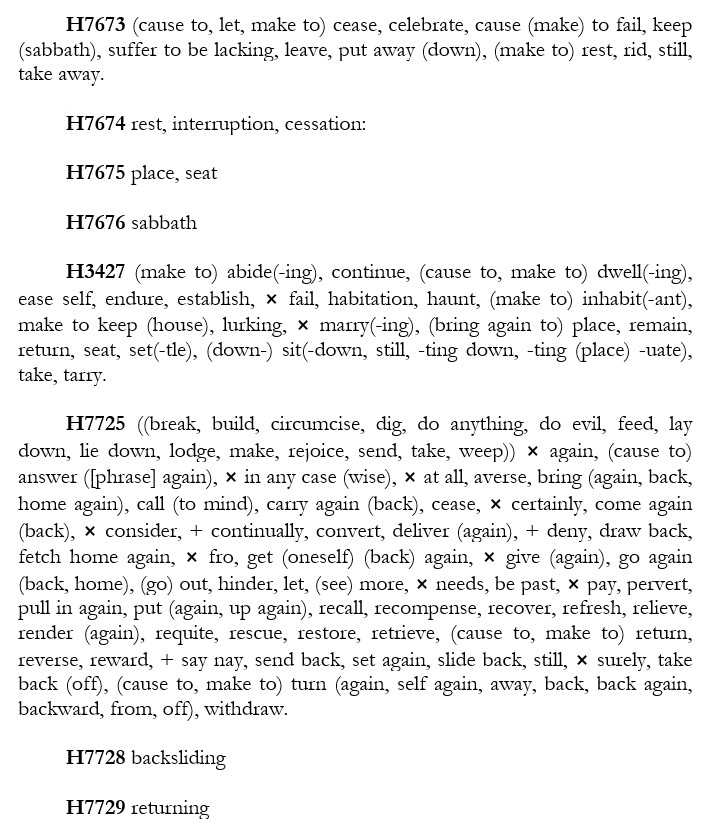Contents
- 1 What is the deep Bible meaning of the Biblical Hebrew word Shabbat? Key 7 is each Biblical Hebrew word tells a story. What is the story of Shabbat?
- 1.1 Some Biblical Hebrew Root Words are interrelated
- 1.2 SHABBAT (Genesis 2:2 … He rested on the seventh day.)
- 1.3 Yashav (Gen. 4:16 … and dwelt in the land of Nod. Note relation to H7675 above)
- 1.4 SHOOV (see Genesis 3:19 … unto dust shall you return.)
- 1.5 The Story of Shabbat
- 1.6 Dig Deeper into The Explanation
What is the deep Bible meaning of the Biblical Hebrew word Shabbat? Key 7 is each Biblical Hebrew word tells a story. What is the story of Shabbat?

Shabbat, Sabbath, the seventh day of the week.
Practically everyone has heard the term Shabbat. They might not know which day of the week it is, Saturday or Sunday, but most know it means the day of rest. Already, you need three English words to render some meaning. But key 7 to master Biblical Hebrew is each word tells a story. Each Biblical Hebrew word incorporates many of the seven keys, multiple meanings, maybe contradictory meanings, literal and figurative understanding. Shabbat means a whole lot more than just a day of rest.
Here are four biblical texts from the Kings James Bible. Notice the highlighted, bold, italicized words. You shall see they are all the root (Key 6) of Shabbat.
If he rise again, and walk abroad upon his staff, then shall he that smote him be quit: only he shall pay for the loss of his time, and shall cause him to be throughly healed.
Proverbs 20:3
It is an honour for a man to cease from strife: but every fool will be meddling.
Isaiah 30:7
For the Egyptians shall help in vain, and to no purpose: therefore have I cried concerning this, Their strength is to sit still.
Obadiah 1:3
The pride of your heart has deceived you, you that dwell in the clefts of the rock, whose habitation is high; that says in his heart, Who shall bring me down to the ground?
In the image below, even if you have no knowledge of Biblical Hebrew whatsoever, it is easy to see the four Hebrew words from excerpts of the four verses above have three identical letters: shin, beth, taf. (Hebrew is written from right to left. That’s why the English is jumbled and also needs to be read, in blocks, from right to left).
What I submit to you is this: From reading these four verses in English—in any and all translations—you’d never guess or know in 1000 years that these four phrases come from ONE ORIGINAL Hebrew word shevet. And you’d be hard-pressed to find the relationship between these phrases, if any.
What, if anything, do these four English words from the single Hebrew word (shevet) have in common?
- Loss of time (Strong’s H7674)
- Ceasing (H7674)
- Sitting still (H7674)
- Habitation (Strong’s H2437) / cease (Interlinear H7674)
We’ve already seen examples of this with rosh: head – beginning and noah: quiet – rest. Every word in Biblical Hebrew is either a root or the derivative of a root. It is impossible to see this in your native language where totally different unrelated translated words, like the two examples above: head/beginning, quiet/rest, cannot render full meaning when taken separately. This is identical for shevet, the root of Shabbat.
Another factor to do with the 2000 roots is some of the roots are actually interrelated, further enhancing the relationships and meanings. I can’t get into it here but, for those who know a little Hebrew, here’s the transliteration of three words: yashav, shevet, shoov. Their basic meanings include sit, Shabbat, and return. I say basic meanings because, as we saw with noah there are multiple native language translations for each of these three roots.
When you read any of these three words in your native language there’s absolutely no way of even knowing they have a common root, let alone realizing there’s an indelible relationship between those three concepts.
Your exercise: Visit UnlockBibleMeaning.com and find the verses in brackets below to consult the Biblical Hebrew meanings of shabbat, yashav, and shoov.
SHABBAT (Genesis 2:2 … He rested on the seventh day.)
KJV – (cause to, let, make to) cease, celebrate, cause (make) to fail, keep (sabbath), suffer to be lacking, leave, put away (down), (make to) rest, rid, still, take away.
H7674 שֶׁבֶת shebeth sheh’-beth; from H7673 (שָׁבַת); rest, interruption, cessation:
KJV – cease, sit still, loss of time.
H7675 שֶׁבֶת shebeth sheh’-beth; infinitive of H3427 (יָשַׁב); properly, session; but used also concretely, an abode or locality:
KJV – place, seat. Compare H3429 (יֹשֵׁב בַּשֶּׁבֶת).
H7676 שַׁבָּת shabbâth shab-bawth’; intensive from H7673 (שָׁבַת); intermission, i.e (specifically) the Sabbath:
KJV – ([phrase] every) sabbath.
H7677 שַׁבָּתוֹן shabbâthôwn shab-baw-thone’; from H7676 (שַׁבָּת); a sabbatism or special holiday:
KJV – rest, sabbath.
Yashav (Gen. 4:16 … and dwelt in the land of Nod. Note relation to H7675 above)
KJV – (make to) abide(-ing), continue, (cause to, make to) dwell(-ing), ease self, endure, establish, ⨯ fail, habitation, haunt, (make to) inhabit(-ant), make to keep (house), lurking, ⨯ marry(-ing), (bring again to) place, remain, return, seat, set(-tle), (down-) sit(-down, still, -ting down, -ting (place) -uate), take, tarry.
H3429 יֹשֵׁב בַּשֶּׁבֶת Yôshêb bash-Shebeth yo-shabe’ bash-sheh’-beth; from the active participle of H3427 (יָשַׁב) and H7674 (שֶׁבֶת), with a preposition and the article interposed; sitting in the seat; Joshebbash-Shebeth, an Israelite:
KJV – that sat in the seat.
SHOOV (see Genesis 3:19 … unto dust shall you return.)
KJV – ((break, build, circumcise, dig, do anything, do evil, feed, lay down, lie down, lodge, make, rejoice, send, take, weep)) ⨯ again, (cause to) answer ([phrase] again), ⨯ in any case (wise), ⨯ at all, averse, bring (again, back, home again), call (to mind), carry again (back), cease, ⨯ certainly, come again (back), ⨯ consider, + continually, convert, deliver (again), + deny,
draw back, fetch home again, ⨯ fro, get (oneself) (back) again, ⨯ give (again), go again (back, home), (go) out, hinder, let, (see) more, ⨯ needs, be past, ⨯ pay, pervert, pull in again, put (again, up again), recall, recompense, recover, refresh, relieve, render (again), requite, rescue, restore, retrieve, (cause to, make to) return, reverse, reward, + say nay, send back, set again, slide back, still, ⨯ surely, take back (off), (cause to, make to) turn (again, self again, away, back, back again, backward, from, off), withdraw.
H7726 שׁוֹבָב shôwbâb sho-bawb’; from H7725 (שׁוּב); apostate, i.e. idolatrous:
KJV – backsliding, frowardly, turn away (from margin).
H7727 שׁוֹבָב Shôwbâb sho-bawb’; the same as H7726 (שׁוֹבָב); rebellious; Shobab, the name of two Israelites:
KJV – Shobab.
H7728 שׁוֹבֵב shôwbêb sho-babe’; from H7725 (שׁוּב); apostate, i.e. heathenish or (actually) heathen:
KJV – backsliding.
H7729 שׁוּבָה shûwbâh shoo-baw’; from H7725 (שׁוּב); a return:
KJV – returning.
The common denominator of shevet, yashav, and shoov consists of the 2 letters shin and beth (שׁבֵ – with these three words, the beth – בֵ is pronounced vav. Note H7726 has the בָב -doubled- to become a 3 letter root but derives from H7225 with one ב) Needless to say, it is impossible to see these roots and hence these intricate and revealing relationships in any translation. I repeat, the native language translations of these words are correct. But they reveal a very, very limited amount of information. It is inconceivable to have complete understanding.
If you reread the above points, you’ll now realize that each Biblical Hebrew word: elohim, rosh and noah is either a root (rosh is the only one here) or a derivative of a root. The point being you’re beginning to see fundamental concepts in Biblical Hebrew that open up a more complete understanding of this best-seller, the Bible. Whether you believe the Bible or not, it’s full of words that will open up this literary marvel as never before.
This is theology. The proper exploration of God’s Word to find out about what GOD SAYS regarding our world, ourselves, and how it should all tick in harmony.
The Story of Shabbat
From the multiple translations of the Biblical Hebrew roots and derivatives we end up with is a jumble of English words related to shevet – Shabbat. Here they are.
Now for the story, which is corroborated by many other Bible verses which you either know or can study. Unfortunately, we don’t have the space here. All the words in italics below are from the list of KJV multiple translations (Key 1) above.
Shabbat (Key 6 – name) is a day of rest. On that day, we cease work. We don’t lose (waste) our time instead, we celebrate God. It is a day of rejoicing. The Sabbath is figurative (Key 4) of three other aspects of our Christian life.
- Our spiritual conversion: We return from backsliding. We do evil (Key 2 – contradictory meanings) but God, in His mercy, continues to relieve and refresh us. We must endure, reversing our wayward ways and look forward to the reward.
- Christ’s role in our lives: He delivers, rescues, and restores us.
- Our future recompense: He will bring us home again. There will be a marriage and we will abide with Him. We will sit down with Him in His habitation. In His dwelling place, where we’ll be established forever.
That is the story of Shabbat. It includes about 20 translations but we can write a fuller story of Shabbat and include every single KJV translation. The weekly Sabbath narrates the entire purpose of God for each person, our spiritual pathway leading to eternal life in the Kingdom of God.
Key 7 is Biblical Hebrew words narrate stories. And, as you see, all the stories, like pieces of the puzzle, assemble perfectly. One final word, next week, shalom, the most common Hebrew word practically everyone knows. But you’ll learn the incredibly profound story it tells.
Dig Deeper into The Explanation
Join The Explanation Newsletter to stay informed of updates. and future events. No obligations, total privacy, unsubscribe anytime, if you want.
Online Study Courses to Unlock Bible meaning via Biblical Hebrew… with no fuss. Free video courses that put you in the driver’s seat to navigate the Bible as never before. Join now
The Explanation series of seven books. Free to read online or purchase these valuable commentaries on Genesis 1-3 from your favorite book outlet. E-book and paperback formats are available. Use this link to see the details of each book and buy from your favorite store.
Since you read all the way to here… you liked it. Please use the Social Network links just below to share this information from The Explanation, Shabbat – Biblical Hebrew Words Tell Revealing Stories



